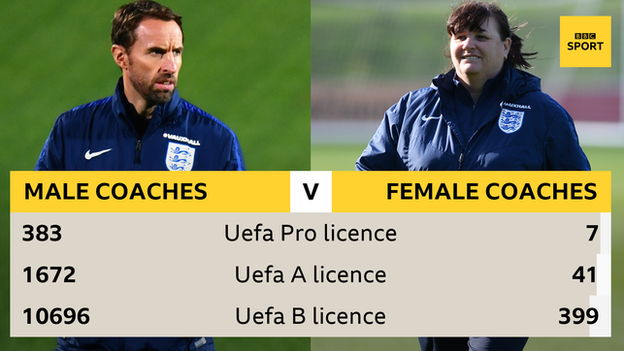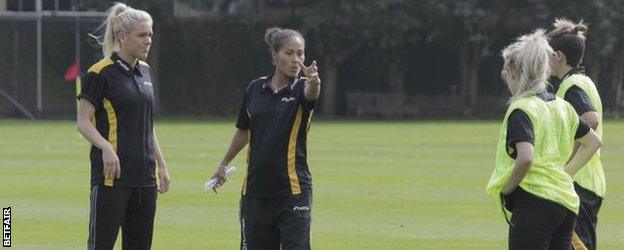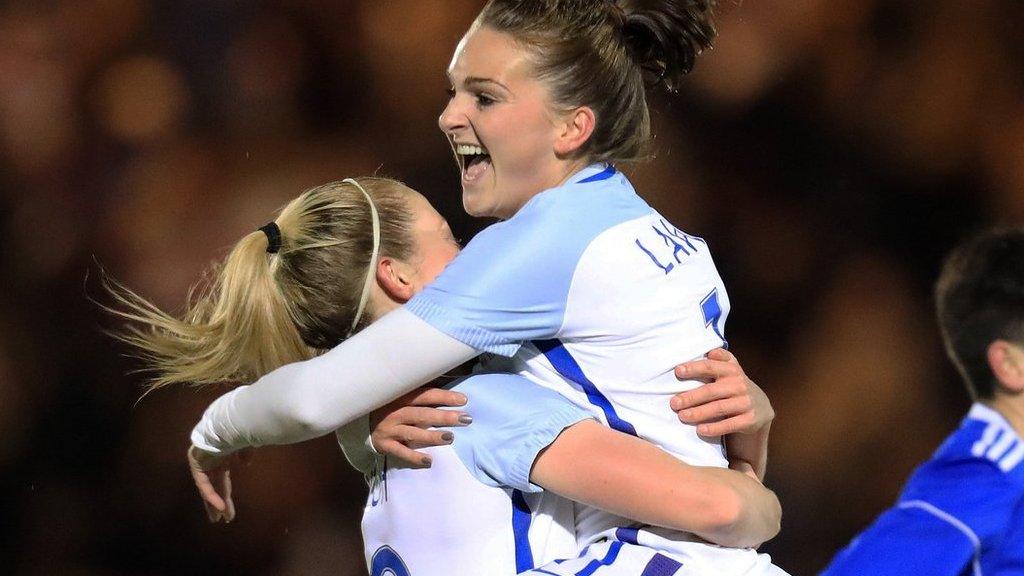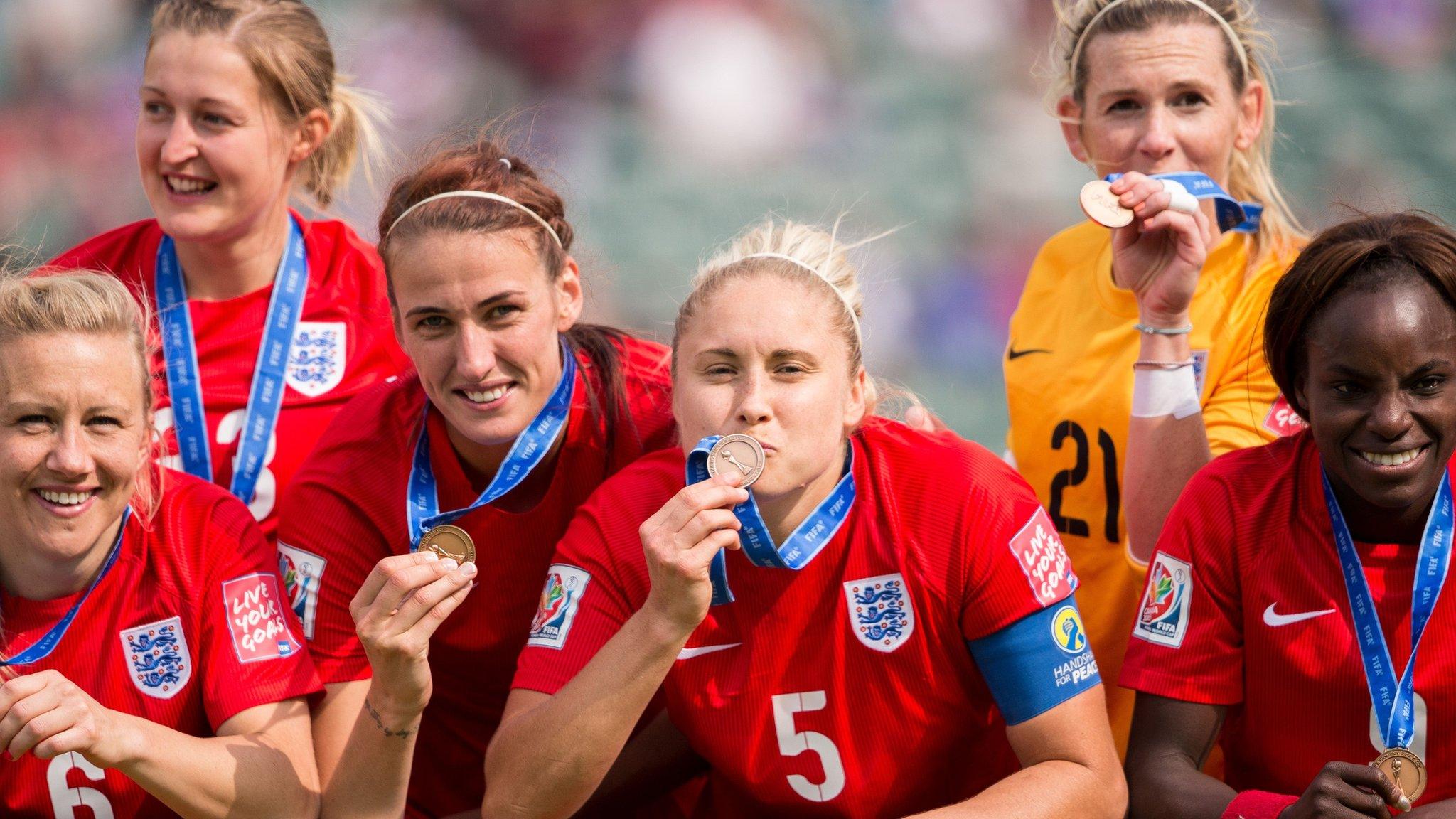Mark Sampson: England struggling to find female options to replace sacked manager
- Published
The Football Association is struggling to find female candidates for the England manager's job, says head of women's football Baroness Campbell.
Mo Marley, the under-19s coach, was named as interim boss in September following the sacking of Mark Sampson.
The FA says it will not appoint a replacement before the end of the year, adding the process is "ongoing".
"We have plenty of candidates in the pool, but not a lot are women," Campbell told BBC Sport.
"These things don't change overnight but we are absolutely determined to get more women into coaching."
Welshman Sampson took over from Hope Powell in 2013, before being dismissed following evidence of "inappropriate and unacceptable" behaviour with female players in a previous role.
Campbell said there was "not a woman who could step into Hope Powell's shoes" at the time of his appointment.
"There was not a natural successor," she added. "But what you can't argue is that Mark Sampson took us from 14th to third in the world.
"If you look at the England age-group squads, we are now seeing a change with more women leading teams - but we have a lot of work to do."
What is the FA doing to address the issue?

Number of male and female coaches holding elite coaching qualifications in England as of November 2017
Of the 1,713 coaches in England holding the Uefa A licence, external - the qualification for coaches "working within or aspiring to work within the professional game" - just 41 are female.
And of the 390 who have qualified with the Uefa Pro licence,, external a mandatory requirement of every Premier League manager, only seven are women.
It costs £3,655 to take your Uefa A licence in England, while the Uefa B badge requires applicants to pay between £550 and £700.
To complete even the cheaper of the two awards, candidates must have completed both course levels below it, which are priced and administered by the Country FAs.
"We can't look back with pride on what we've done, but we are not in a hugely different place to many other sports in terms of women in coaching," added Campbell, the former head of UK Sport.
"It's not about neglect, it's more that we haven't proactively gone out and tried to address the big issues. Now we are doing this."
The FA says it will be providing subsidies and support for the basic courses through scholarships and bursaries - and also running women-only intakes for some licences.
In the new club licences granted for the 2018-19 Women's Super League season, clubs had to offer an apprenticeship for female coaches.
All of this comes under the command of the FA's new head of women's coach development, Audrey Cooper, who has filled a role created by Campbell after her own appointment in January.
"We are now very proactive and we are going to see a significant change," Campbell said, adding that there were more women on the A licence courses in 2017 than ever before.
"What we have to do now is make sure we give people structured opportunities to practise their skills so they are more ready to step into those roles. I don't think we have helped them on that journey.
"We are redressing the balance but we can't just magic women onto these courses. We've got to build and help women progress through the levels."
'It's expensive and you can't get a job' - case study
Former Arsenal and England midfielder Rachel Yankey says the biggest barriers are the lack of coaching opportunities and the absence of female role models.
The 38-year-old, who has played 129 times for her country, is taking her A licence alongside a select group of former England women internationals.
"In men's football, I can't name a single female coach. And out of 10 coaches in Women's Super League 1, there are only three females," she told BBC Sport.
"If you are a young coach wanting to go and succeed, the courses are expensive. You will put a lot of time and money behind something which, from the looks of it, you're not going to achieve."

Rachel Yankey (centre) is taking her A licence and hopes to coach at the elite level in the future
Chelsea's Emma Hayes, Kelly Chambers at Reading and Sunderland's Melanie Reay are the only female head coaches in WSL 1.
However, a campaign fronted by Yankey - called Betfair Fairer Game - is aiming to encourage 50 female coaches into the sport.
"It's no use just going on a B or A licence, there needs to be somewhere to coach afterwards," Yankey added.
"The biggest barrier is that there are not enough clubs coaches can go to to gain experience. We need football to be more open-minded and especially the chairman and managers who are already there.
"You've got to learn somewhere and the clubs need to embrace this and have people who are willing to nurture the coaches and allow them to gain confidence in different situations."
Yankey, who earned her B licence with the support of the Professional Footballers' Association, also says there was little signposting for players wanting to become coaches.
"We want to have role models and the quickest and easiest way of having role models is to look at players," she said.
"When I was playing, the pathways were not there to encourage us into coaching. But I do believe the FA are changing that now and I'm happy with their promise they will make changes."
Should the next England manager be female?
Smith would like the next England manager to be female
Campbell, alongside FA technical director Dan Ashworth, is responsible for the appointment of the England women head coach and interviews were scheduled to take place in early December.
Hayes, Manchester City's Nick Cushing and Seattle Reign's Laura Harvey were said to be among the possible contenders, as was the English head coach of Canada women, John Herdman.
However, Cushing withdrew his application earlier this month, Hayes signed a new three-and-a-half-year contract with Chelsea in October and, despite resigning as Seattle Reign's head coach, Harvey has taken over at newly founded Utah Royals.
Caretaker Marley applied for the permanent position and is considering if she wants the job on a long-term basis after her three-game spell in charge.
England's record goalscorer Kelly Smith said earlier this year the head coach "should be female", and former boss Powell told the Women's Football Show that would be her preference, too.
However, Campbell is keeping an open mind. "The players want the best coach possible and that's what they're going to get," she said.
"I want to give them every chance of winning the World Cup in two years' time."
Yankey, too, warned that appointing the wrong woman would "do more harm than good".
"I would hate to see the England football team lose what they've got and worked so hard to achieve because they've employed a manager just because they are female and for a role-model status.
"We can't gift people a job because of their gender, they have to be good enough."
- Published15 December 2017

- Published6 October 2017
